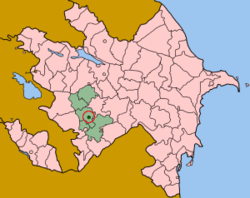| Revision as of 12:07, 3 February 2007 view sourceArtaxiad (talk | contribs)16,771 editsm →History← Previous edit | Revision as of 12:46, 3 February 2007 view source Alpertunga5000 (talk | contribs)1,808 editsNo edit summaryNext edit → | ||
| Line 89: | Line 89: | ||
| }} <!-- Infobox ends --> | }} <!-- Infobox ends --> | ||
| '''Stepanakert''' (]: Ստեփանակերտ; officially known as ''Xankəndi'' in ], transliterated as '''Khankendi''') is the ] of the ], a de-facto independent republic which is officially part of ].<ref>''1993 UN Security Council Resolutions on Nagorno-Karabakh, US State Department, accessed February 1, 2007 http://www.state.gov/p/eur/rls/or/13508.htm</ref>. The city has a population of about 40,000. As of ], Stepanakert, like most of Nagorno-Karabakh, remains under ] control, and |
'''Stepanakert''' (]: Ստեփանակերտ; officially known as ''Xankəndi'' in ], transliterated as '''Khankendi''') is the ] of the ], a de-facto independent republic which is officially part of ].<ref>''1993 UN Security Council Resolutions on Nagorno-Karabakh, US State Department, accessed February 1, 2007 http://www.state.gov/p/eur/rls/or/13508.htm</ref>. The city has a population of about 40,000. As of ], Stepanakert, like most of Nagorno-Karabakh, remains under ] control, and the entire local Azerbaijani population has fled the city. | ||
| ==History== | ==History== | ||
| ] | ] | ||
| Although earlier settlements were possible, the founding of the town is traced to the late XVIII century by the Azerbaijani Karabakh ], and was thus called Khankendi (Khan's village in ]). In ] it was renamed to Stepanakert, to honor ], an Armenian ] leader from ], and upgraded to a city status, becoming the new regional capital of the newly created Nagorno-Karabakh Autonomous Oblast (NKAO). In 1991, the Soviet Azerbaijani government restored the name of the city back to Khankendi. Fighting broke out over control of Nagorno-Karabakh which resulted in Armenian control of the region, with about 16% of Azerbaijan currently occupied by Armenian forces. An OSCE-mediated cease-fire has been observed since ]. | |||
| by Svante E. Cornell</ref> of what had been the autonomous ] of Nagorno-Karabakh with a majority Armenian population. Fighting broke out over control of Nagorno-Karabakh which resulted in Armenian control of the region and a connecting corridor to Armenia to the west. There has been an unofficial but observed cease-fire in place since ]. | |||
| ==Economy== | ==Economy== | ||
Revision as of 12:46, 3 February 2007
Place| Stepanakert
ՍտեփանակերտKhankendi (Xankəndi) | |
|---|---|
| Parliament building in Stepanakert.Parliament building in Stepanakert. | |
 Map of Azerbaijan showing the town of Stepanakert within Nagorno-Karabakh. Map of Azerbaijan showing the town of Stepanakert within Nagorno-Karabakh. | |
| Province | Stepanakert (City) |
| Government | |
| • Mayor | Eduard Aghabekian |
| Elevation | 810 m (2,670 ft) |
| Population | |
| • Total | ~40,000 |
Stepanakert (Armenian: Ստեփանակերտ; officially known as Xankəndi in Azerbaijan, transliterated as Khankendi) is the capital city of the Nagorno-Karabakh Republic, a de-facto independent republic which is officially part of Azerbaijan.. The city has a population of about 40,000. As of 2007, Stepanakert, like most of Nagorno-Karabakh, remains under Armenian military control, and the entire local Azerbaijani population has fled the city.
History
Although earlier settlements were possible, the founding of the town is traced to the late XVIII century by the Azerbaijani Karabakh khan, and was thus called Khankendi (Khan's village in Azerbaijani). In 1923 it was renamed to Stepanakert, to honor Stepan Shahumyan, an Armenian communist leader from Baku, and upgraded to a city status, becoming the new regional capital of the newly created Nagorno-Karabakh Autonomous Oblast (NKAO). In 1991, the Soviet Azerbaijani government restored the name of the city back to Khankendi. Fighting broke out over control of Nagorno-Karabakh which resulted in Armenian control of the region, with about 16% of Azerbaijan currently occupied by Armenian forces. An OSCE-mediated cease-fire has been observed since 1994.
Economy

prior to the war, Stepanakert's economy revolved mostly around food processing, silk weaving, and winemaking. After the war, the city's economy was greatly damaged, but in recent years, largely due to the investments of the Armenian Diaspora, economic activity has picked up in Stepanakert.
Buildings and structures
Religious
There is not a traditional church in Stepanakert as of (2007) although most of the population of the city are Christians. The believers attend the church that is in the building of the House of Culture. There is one ancient church in the city that was build in the 18th century, but it is not operating. On September 15, 2006 the foundation stones of St. Jacob Church in Stepanakert were laid. Armenian benefactor Vache Yepremian from Los Angeles is sponsoring the construction of the church. Its construction will probably last for 2-3 years.
It is also the home of the Artsakh State Museum.
Sister cities
 Montebello, California, USA (2005)
Montebello, California, USA (2005)
References
- 1993 UN Security Council Resolutions on Nagorno-Karabakh, US State Department, accessed February 1, 2007 http://www.state.gov/p/eur/rls/or/13508.htm
External links
- Nagorno-Karabakh Nagorno-Karabakh's website
- Karabakh’s Election Conundrum November 2005 article about elections for seats in the Milli Mejlis (Azerbaijani parliament) for Azeri refugees
- Stepanakert Armeniapedia atricle
| Administrative divisions of Artsakh | ||
|---|---|---|
| Capital city | ||
| Provinces | ||
| Provincial capitals | ||
| Other urban communities |
| |